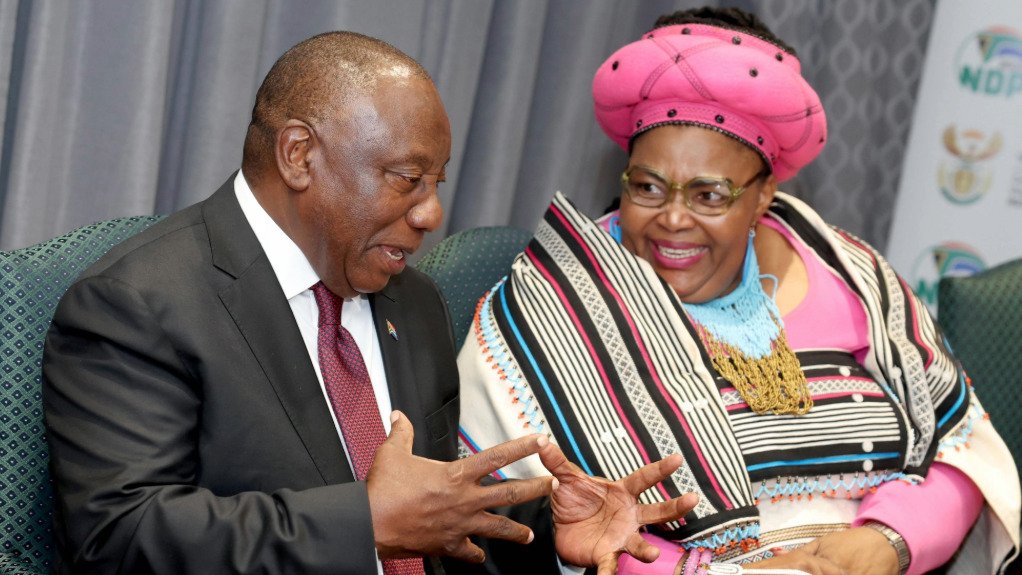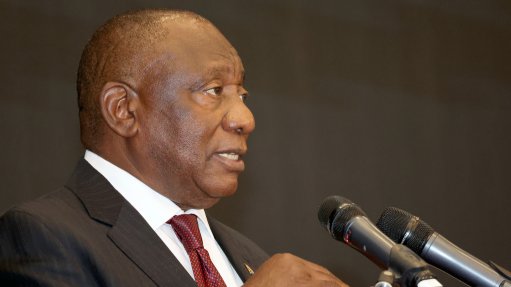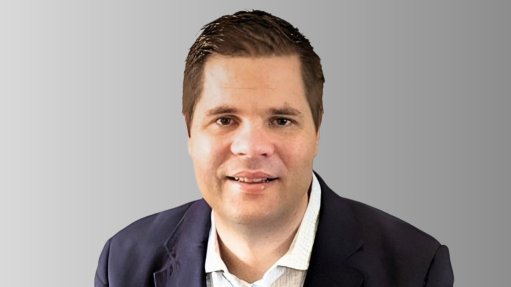Performance in water sector needs to be stepped up, urges Ramaphosa
South Africa’s embattled water sector is the number one priority for government, and implementation will be critical in turning the dire situation around, President Cyril Ramaphosa said on Thursday.
Speaking at the National Water and Sanitation Indaba, he told delegates that there was a need for course-correction and comprehensive plan that would expand access to water and sanitation services, improve the quality of water and sanitation infrastructure and bring stability and good governance to all the entities involved in South Africa’s water stewardship.
The National Water and Sanitation Indaba is building on the outcomes of the two-day Water Summit held in January 2024, which identified the critical challenges facing the sector.
These include aging and poorly maintained infrastructure, organised criminality, water tankering and extortion mafia, vandalism, corruption, the growth of informal settlements, financial mismanagement, revenue shortfalls, mounting sector debt, illegal water connections, overconsumption and high levels of physical water losses.
“The challenge of water in our country is an emergency. This Indaba must not become an exercise of problem-diagnosing: the challenges are well-known,” he said, pointing out that these challenges had been consistently reflected in reports of the Municipal Strategic Self-Assessment, Statistics South Africa and the Auditor-General, besides others.
“In my State of the Nation Address earlier this year I defined a secure and reliable water supply across the country as an urgent strategic priority, and it is our expectation that this Water Indaba will be focused, precise and outcomes-based, and not merely deliberative.”
It was crucial that the recommendations of the 2024 Water Summit, as well as of various reports, including the drop reports, were actually implemented as part of corrective plans, he said.
What was needed was an urgent and high-level national turnaround plan on water security that was aligned to the Government of National Unity’s Medium-Term Development Plan 2025 to 2029, and that harnessed the momentum of the reforms in the sector.
Operation Vulindela has prioritised reforms in the water sector to improve water quality, to catalyse investment in the construction and maintenance of water infrastructure and strengthen regulation in the sector.
Among the urgent interventions Ramaphosa wants to see is ending organised crime within the water sector.
“There are people who make it their business to go and cut water lines to create businesses for themselves,” he said, noting that this ensured failure by the local authority to deliver water, leading to the alternative of relying on them to transport and provide water, as they made money out of transporting water.
“That is the criminality that has now entered the water space, and this is what we must collectively talk about here, and find ways of bringing that to an end.”
At a local government level, financial mismanagement, insufficient revenue collection systems and high levels of physical water losses were compounding existing service delivery problems.
“The mismanagement in our local government space must also come to an end. We must use advanced methods of making sure that the management of this very important resource is well managed.
Ramaphosa further commented that, with this “dire state of affairs”, a decline had been seen in private-sector investment in water infrastructure, a situation that was only now improving.
The municipalities had not reinvested the revenue they earned from the provision of services to the upkeep of key water infrastructure nor were they effectively leveraging the Urban Settlements Development Grant, Municipal Infrastructure Grant and other ring-fenced financial resources to improve the provision of these services in their localities.
“We have implemented a number of strategic interventions to enhance the delivery of water services in municipalities and support them to address their water and sanitation challenges. One such intervention where we are seeing sustained progress is with the Presidential eThekwini Working Group in KwaZulu-Natal.”
The ongoing oversight work of the Presidential Water Task Team will augment these efforts.
In addition, the Water Services Amendment Bill will introduce a licensing system for water service providers, and remove licences where providers do not meet the standards for quality drinking water.
Further, it is expected that, by next year, the National Water Resource Infrastructure Agency, one of the most significant reforms coming to the sector to date, will be established.
“This new agency will bring strategic alignment, consistency and accountability to the various institutional arrangements for water stewardship that have to date proven to be less than ideal.”
Ramaphosa noted, however, that resolving South Africa’s water and sanitation challenges necessitated deeper collaboration between all stakeholders in the water resources management ecosystem.
There needed to be greater cooperation between national and provincial government, the water resource management entities and the private sector to support the turnaround in water stewardship.
“Much of this focus must be on supporting service delivery at local government level, where it matters most. Structural reforms in the water sector, as vital as they are, cannot be effectively implemented without local government being strengthened.
“My call, therefore, to national government and the Department of Water and Sanitation is to use this Indaba as an opportunity to chart a practical course for supporting municipalities in the delivery of water and sanitation,” he concluded.
Article Enquiry
Email Article
Save Article
Feedback
To advertise email advertising@creamermedia.co.za or click here
Announcements
What's On
Subscribe to improve your user experience...
Option 1 (equivalent of R125 a month):
Receive a weekly copy of Creamer Media's Engineering News & Mining Weekly magazine
(print copy for those in South Africa and e-magazine for those outside of South Africa)
Receive daily email newsletters
Access to full search results
Access archive of magazine back copies
Access to Projects in Progress
Access to ONE Research Report of your choice in PDF format
Option 2 (equivalent of R375 a month):
All benefits from Option 1
PLUS
Access to Creamer Media's Research Channel Africa for ALL Research Reports, in PDF format, on various industrial and mining sectors
including Electricity; Water; Energy Transition; Hydrogen; Roads, Rail and Ports; Coal; Gold; Platinum; Battery Metals; etc.
Already a subscriber?
Forgotten your password?
Receive weekly copy of Creamer Media's Engineering News & Mining Weekly magazine (print copy for those in South Africa and e-magazine for those outside of South Africa)
➕
Recieve daily email newsletters
➕
Access to full search results
➕
Access archive of magazine back copies
➕
Access to Projects in Progress
➕
Access to ONE Research Report of your choice in PDF format
RESEARCH CHANNEL AFRICA
R4500 (equivalent of R375 a month)
SUBSCRIBEAll benefits from Option 1
➕
Access to Creamer Media's Research Channel Africa for ALL Research Reports on various industrial and mining sectors, in PDF format, including on:
Electricity
➕
Water
➕
Energy Transition
➕
Hydrogen
➕
Roads, Rail and Ports
➕
Coal
➕
Gold
➕
Platinum
➕
Battery Metals
➕
etc.
Receive all benefits from Option 1 or Option 2 delivered to numerous people at your company
➕
Multiple User names and Passwords for simultaneous log-ins
➕
Intranet integration access to all in your organisation




















